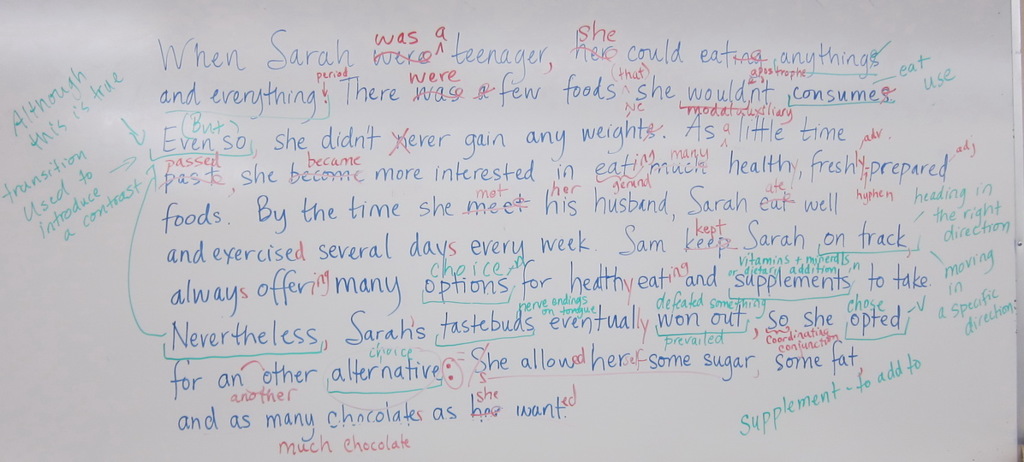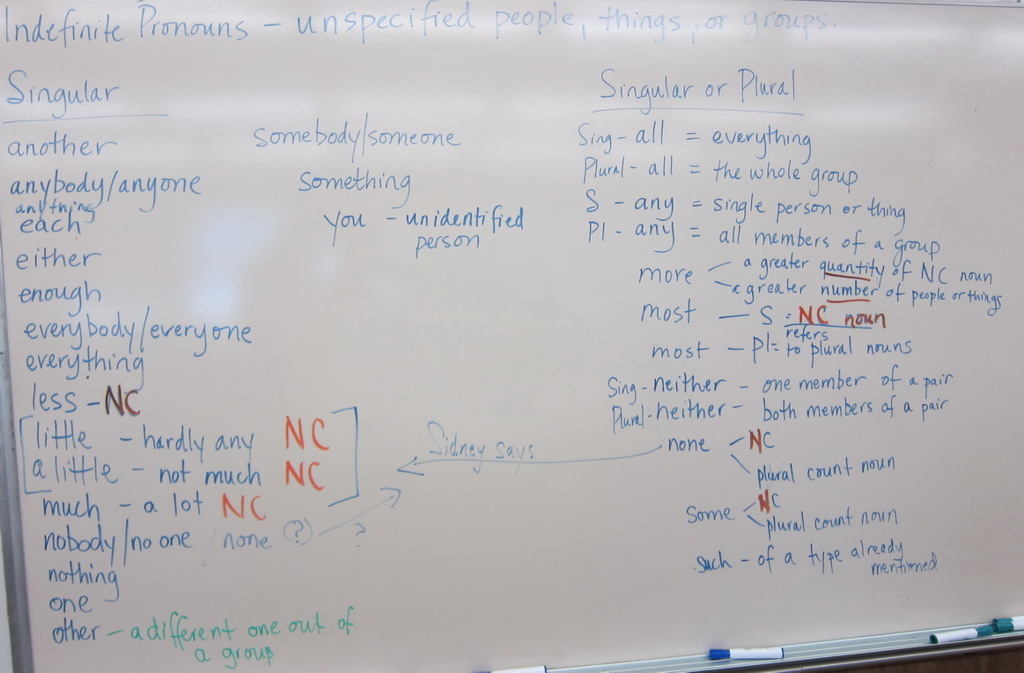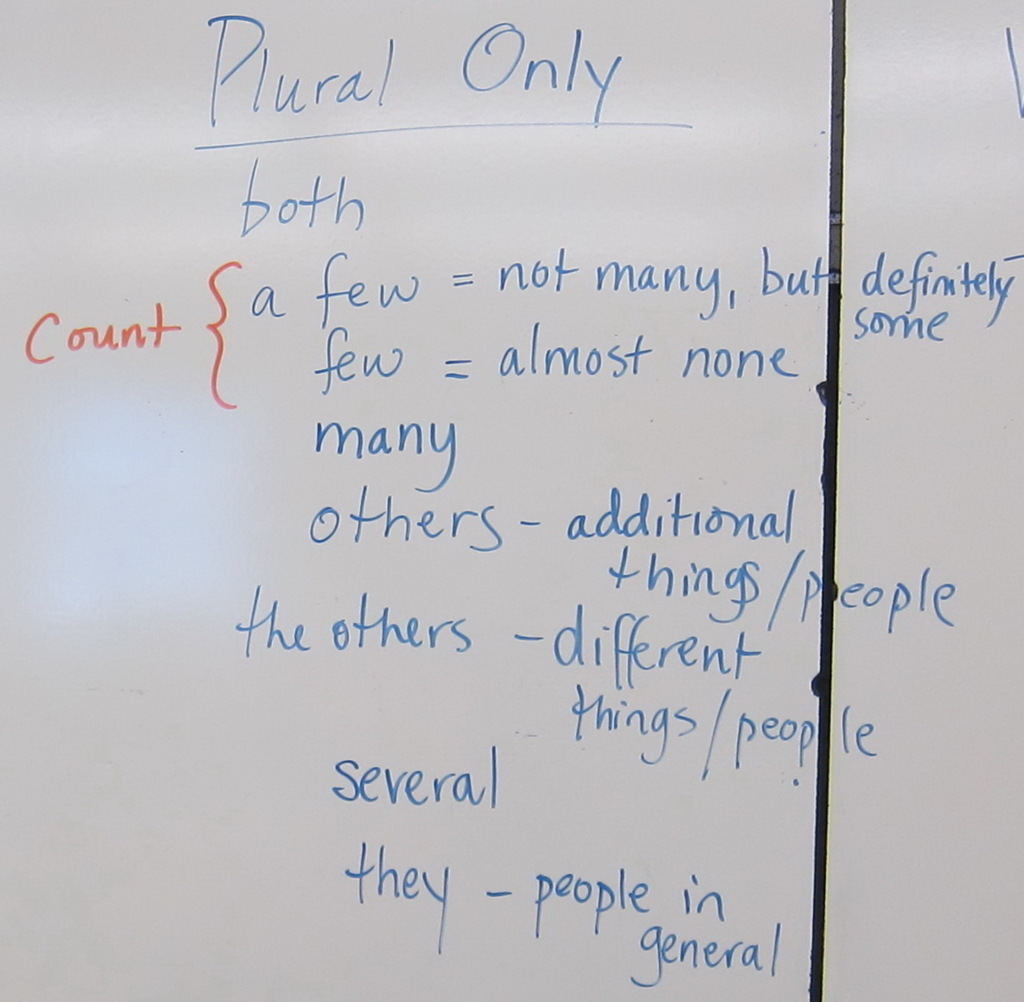

 字體:小 中 大
字體:小 中 大 |
|
|
|||||||
| 2014/09/04 05:40:14瀏覽248|回應0|推薦2 | |||||||
| Teacher; Meg
LL--pp
LL--ccWhen Sarah was a teenager, she could eat anything and everything. There were few foods (that) she wouldn't consume. Even so(but), she didn't gain any weight.(N.C.) As a little time passed, she became more interested in eating many healthy, freshly-prepared foods. By the time she met her husband , Sarah ate well and exercised several days every week. Sam kept Sarah on track(步上軌道), always offering many options for healthy eating and supplement to take. Nevertheless, Sarah's tastebuds eventually won out, so she opted for another alternative(n.選擇的事物/---自由): she allowed herself(reflexive pronoun) some sugar, some fat, and as many chocolates as she wanted.Exercise1. nevertheless KK [͵nɛvɚðəˋlɛs] DJ [͵nevəðəˋles] 仍然,不過,然而2. supplement KK [ˋsʌpləmənt] DJ [ˋsʌplimənt] 增補,補充 3. alternative KK [ɔlˋtɝnətɪv] DJ [ɔ:lˋtə:nətiv] 兩者(或若干)中擇一的;非此即彼的 4. calm KK [kɑm] DJ [kɑ:m] 鎮靜的,沉著的 4. win out 成功; 勝利 succeed 2.最後能成功 5. tastebuds eventual 味蕾最终 eventually KK [ɪˋvɛntʃʊəlɪ] DJ [iˋventjuəli] 最後,終於 **eventually--adv.最後;終於 **consume--eat;use **tastebud--味蕾 **prevail--戰勝;成功;流行--The plague(瘟疫) began to prevail. LL--grammar
LL--pp Singular-- another anybody/anyone anything each either enough everybody/everyone everything less--refers to non-count little; a little--refers to a small amount(N.C.) much--uses for non-count one other--different one out of a group of things Singular or Plural all--S(everything) all--PL(the whole group) **Any is o.k. any--S(single person or thing) Any are welcome. any--PL(all members of a group) most--S NC noun most PL refers to plural nouns none--S/PL neither--S one member of a pair neither--PL both members of a pair some--S NC some--PL refers to plural nouns such--S --this or that such--PL--these Plural both few--almost none a few--not many many--Count Nouns several--Count Nouns(about 3) others--additional people or things the others--different people or things
Excuse me, ask three questions. (1). Does this article have a title? (2). Does this article need to be divided into paragraphs? (3). Does LARA's wifi was finished? Correct my errors, Please! Best, Jack Lee. Hi Jack, I love seeing my lessons on your blog--I hope that task makes what we review in class easier to understand. In answer to your second question, I'll ask another: when you use the term "article," are you referring to the paragraph we correct in class? If so, that paragraph describes a sequence and does not need to be broken up into more paragraphs. To answer the first question, the paragraph does not have a title; I think your use of the opening phrase or the main subject of each paragraph is a good way to indicate the paragraph you're referring to. I'm unclear about your third question. Do you mean to ask, "Is LARA's wireless fidelity finished?" A little bit of time ago, I thought that maybe LARA might provide wifi. It turns out that the LARA wifi password is not made available; wifi at LARA is only available on LARA computers. I hope I've answered your questions sufficiently. If not, I'll see you tomorrow. Meg😀 1. sufficiently KK [səˋfɪʃəntlɪ] DJ [səˋfiʃəntli] 足夠地,充分地. xx. available [əˋveləb!] DJ [əˋveiləbl] 可用的,在手邊的;可利用的 xx sequence KK [ˋsikwəns] DJ [ˋsi:kwəns] 連續;接續;一連串 xxx 函授學校Correspondence (͵kɔrəˋspɑndəns] DJ [͵kɔriˋspɔndəns) Schools 2. I deeply appreciated your answered . 2. |
|||||||
| ( 知識學習|健康 ) |






 Lafayette Adult Resource Academy
Lafayette Adult Resource Academy





